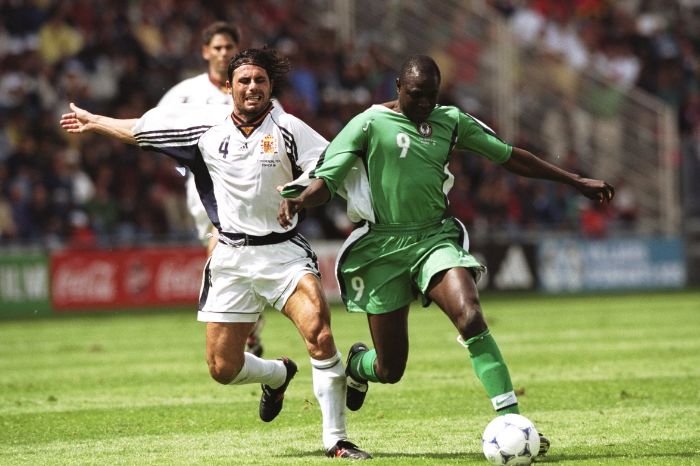Follow @iambolar on X for more expert analysis.
On a day like this, Nigerians pause to remember a legend who not only wore the green and white with pride but etched his name permanently into football history, Rashidi Yekini. Sunday marked 12 years since his passing, and the “Goalsfather,” as he was fondly called, remains a revered figure in African football.
Born on 23 October, 1963, Yekini would have turned 62 on Sunday. Though he left us too soon on 4 May, 2012, at the age of 48, his legacy lives on not just in goals, but in memories, moments, and milestones that defined a golden era for Nigerian football.
Yekini remains Nigeria’s all-time top scorer with 37 goals in 62 international appearances. He was the spearhead of the Super Eagles attack through the 1990s, and his historic goal against Bulgaria at the 1994 FIFA World Cup, the first ever scored by Nigeria at the global showpiece remains iconic. Arms outstretched, fists clenching the net, tears flowing, his iconic celebration remains etched in the hearts of millions.
He also represented Nigeria at seven major tournaments, including two World Cups and multiple African Cup of Nations (AFCON) campaigns. In 1993, he was crowned African Footballer of the Year, the first Nigerian forward to win the prestigious honour.
OTD in 2012, our Legend, Rashidi Yekini passed on to glory. Rest on King of Goals pic.twitter.com/db7lbub7hq
— ?? Super Eagles (@NGSuperEagles) May 4, 2025
Despite his prolific career, Yekini’s final years were marked by personal struggles. He was reportedly dealing with bipolar disorder and depression, and accounts of his illness and isolation sparked concern and debate across the country. Tragically, he passed away under unclear circumstances after a long illness, with some reports suggesting he was forcibly taken from his home just before his death.
His passing not only exposed the frailty of support systems for ex-internationals but also ignited widespread anger about the neglect he suffered by both football authorities and government institutions that once celebrated his brilliance.
Former teammates and football stakeholders continue to remember Yekini with admiration and sorrow paying tributes to him.
From top sports journalists to state governments like Kwara who named a legacy project in his honour, the tributes have never faded. His former club, Gateway United also remembered him warmly, with the club calling him a “gentleman respected by teammates and opponents alike.”
Yekini’s greatness was more than stats and silverware. He was a phenomenon, blessed with blistering pace, aerial power, and a lethal finish. But beyond the pitch, those who knew him describe a humble, gentle soul whose vulnerability in his final years was heartbreaking.
Today, Nigerian football continues to chase a new generation of stars, but Yekini’s record remains untouched. Even Victor Osimhen, Nigeria’s current poster boy, has spoken about his desire to emulate the “pacesetter.”
Twelve years on, Rashidi Yekini’s life and legacy still stir pride, sadness, and a sobering reflection on how we honour our heroes, not just when they shine, but long after the lights have dimmed.
As Nigeria remembers its “Goalsfather,” the question lingers: how many Rashidi Yekinis must we lose before we learn to care for our champions beyond their glory days?
May his soul continue to rest in peace.



